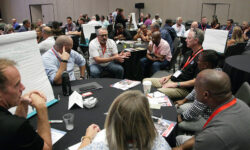Got New Construction? Don’t Forget About Safety and Security
Campus Safety Conference presenters Randy Atlas and Jim Grayson explain why CPTED must be in new construction and renovation projects.

Security and safety features should be built into the campus environment through good design, architecture, functional management, operational policies and procedures, technology and equipment.
Security may be the most fundamentally misunderstood discipline in American education. Few educators can define it, and fewer still can create a program that fully realizes its potential. Administrators see security programs as cost-centered expenditures that compete directly for scarce funding with the school’s primary mission: education. Properly designed security programs, however, can actually produce a generous return on investment (ROI) and become critical support for the school’s educational efforts.
Security experts Randy Atlas and Jim Grayson will present their views on this topic at their Campus Safety Conference sessions (East and West), titled Designing Safe Schools with CPTED: Crime Prevention Through Environmental Design and Crime Prevention Through Environmental Design Enhanced “CPTED,” respectively. The conferences will take place in Washington, D.C., July 25-26 and in Long Beach, Calif., August 9-10.
RELATED: How Security Can Pay for Itself
As America’s only architect/criminologist, Atlas is president of Atlas Safety & Security Design Inc., in Fort Lauderdale, Fla. A registered architect in Florida, Atlas is nationally accredited with the National Council Architectural Registration Board (NCARB), and a member of the American Institute of Architects. Grayson is a senior security consultant whose career spans more than 35 years in law enforcement and security consulting. He holds a degree in criminal justice and a CPP security management credential from ASIS.
In this Q&A, Atlas provides a preview of the sessions and explains the role that architectural design plays in school safety and security.
Campus Safety: What is Crime Prevention Through Environmental Design (CPTED)?
Atlas: It’s about how to design security and safety features that can be built into the school environment through good design, architecture, functional management, operational policies and procedures, and technology and equipment. That’s how all of the dots connect.
Campus Safety: Where do schools go wrong when it comes to CPTED?
Atlas: It’s fair to say that most K-12 schools don’t really plan for security, and they definitely don’t design for security. It’s usually just an afterthought even though it is now an industry standard of care. With the exception of Florida, Connecticut and Virginia, in fact, building codes don’t even require security features. In all other states, schools are pretty much on on their own and left to rely on their architects to design security into their buildings.
Campus Security: Why is leaving it up to the architects a big problem?
Atlas: Because architects don’t learn [about security] in school, even though they should. I teach a CPTED course at Florida Atlantic University, but that’s just one of two or three places in the United States that offers this type of coursework as part of its architecture curriculum.
Campus Security: What do you hope attendees take away from the CPTED conference sessions?
Atlas: I’d like school administrators to know that they need to participate in the design process of new schools, the expansion of schools or the renovation of schools. If they don’t participate in the process, then they’ll be left out of the subsequent results.
The third annual Campus Safety Conferences are education and training events for anyone who has a stake in ensuring the public safety and security of our nation’s schools, universities, and colleges. Taking place in Washington, D.C., July 25-26 and Long Beach, Calif., Aug. 9-10, the conferences provide full-day training workshops, a campus police chief and a K-12 safety panel, dozens of conference sessions, and more than 35 companies showcasing their products, services, and technologies.
To register for the Campus Safety Conferences, visit CampusSafetyConference.com. Randy Atlas will be speaking at CSC East, K-12 Track, on July 25-26 and Jim Grayson will be speaking at CSC West, Higher Education Track, on August 9-10.
Photo Thinkstock
If you appreciated this article and want to receive more valuable industry content like this, click here to sign up for our FREE digital newsletters!
 Leading in Turbulent Times: Effective Campus Public Safety Leadership for the 21st Century
Leading in Turbulent Times: Effective Campus Public Safety Leadership for the 21st Century
This new webcast will discuss how campus public safety leaders can effectively incorporate Clery Act, Title IX, customer service, “helicopter” parents, emergency notification, town-gown relationships, brand management, Greek Life, student recruitment, faculty, and more into their roles and develop the necessary skills to successfully lead their departments. Register today to attend this free webcast!







